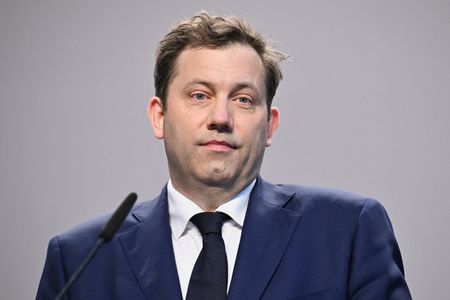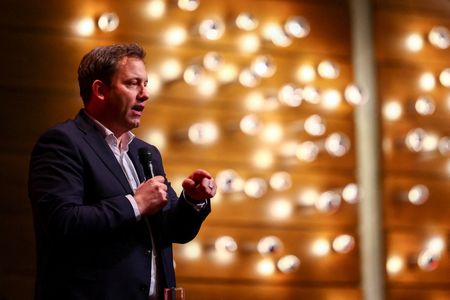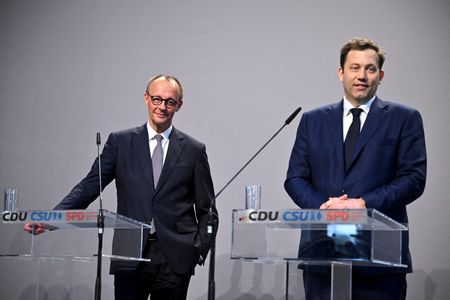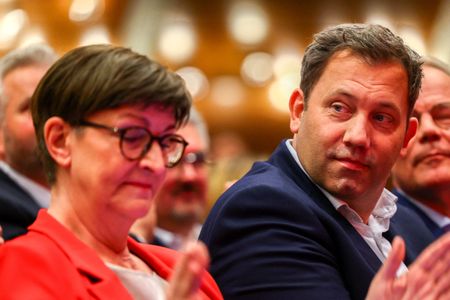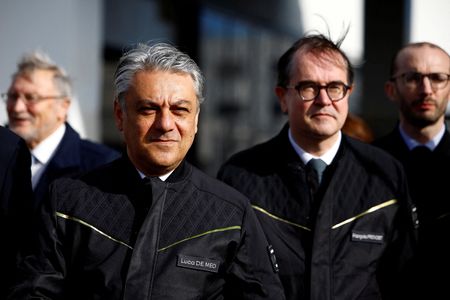By Maria Martinez
BERLIN (Reuters) -Lars Klingbeil, Germany’s next vice chancellor and finance minister, is an experienced Social Democrat lawmaker who has sat in parliament for more than 15 years, but his area of expertise has been in defence rather than finance.
Now, as guardian of Germany’s public finances, Klingbeil, 47, will oversee a massive expansion in defence spending after a decision of Germany’s outgoing government – in the face of heavy U.S. pressure and Russia’s ongoing war in Ukraine – to remove military investments from rules that cap borrowing.
Germany’s parliament approved in March plans for a huge spending surge which also includes a 500 billion euro ($568 billion) special fund for infrastructure, casting aside decades of fiscal conservatism in hopes of reviving economic growth.
Klingbeil had long called for reform of the so-called ‘debt brake’, which restricts public borrowing, saying Germany was “on the completely wrong path”.
This contrasts with the view of his predecessor at the finance ministry, fiscal hawk Christian Lindner of the Free Democrats, whose fierce defence of the debt brake played a crucial role in the break-up of the previous SPD-led coalition.
The centre-left SPD on Wednesday formally backed the new coalition led by conservative Friedrich Merz, opening the way for it to be sworn in next Tuesday. The SPD will formally nominate Klingbeil for finance minister on Monday. His SPD colleague Boris Pistorius will stay on as defence minister.
Known for his charismatic personality and strong communication skills, Klingbeil is seen as a rising star within the SPD and a potential future chancellor. He has been party co-leader over the past four years with Saskia Esken.
CAUTION
Klingbeil played a key role in the negotiations with Merz’s CDU/CSU conservative bloc in reaching the coalition agreement, but has been cautious so far in his public statements about the economy and how he will tackle his new job.
“Everything is subject to financing,” he said in a recent TV interview while discussing the new coalition’s ambitious public spending plans.
In a separate interview for newspapers of the Funke media group, Klingbeil said money must be spent “sensibly and effectively in the interests of citizens and the economy”.
His first major task will be to present a draft budget for 2025, which has been delayed by the snap February election in which the SPD won just 16% of the vote, behind Merz’s conservatives and the far-right Alternative for Germany (AfD).
The son of a soldier, Klingbeil became a member of the defence committee at the Bundestag in 2009 and witnessed the effects of underinvestment in the armed forces of his country that Merz has vowed to end in an era when Europe can no longer automatically rely on the United States’ security guarantee.
Klingbeil was born into a working-class family in Soltau in the state of Lower Saxony in northern Germany. He is an avid supporter of FC Bayern soccer team and played in a punk rock band “Sleeping Silence” in his youth.
As a former chairman of the Young Socialists in his state, he is keen to modernise the SPD and make it more attractive to younger voters, and has focused within the party on issues such as climate change, social justice and income inequality.
“I want to work as parliamentary group leader and as party leader to ensure that many young faces are also publicly visible,” Klingbeil said after the February election.
As well as managing Germany’s state finances and continuing to co-lead his party, Klingbeil will face a further challenge in trying to blunt the increasing appeal of the anti-immigration AfD party, which he says is a “threat to democracy”.
($1 = 0.8801 euros)
(Editing by Gareth Jones)

